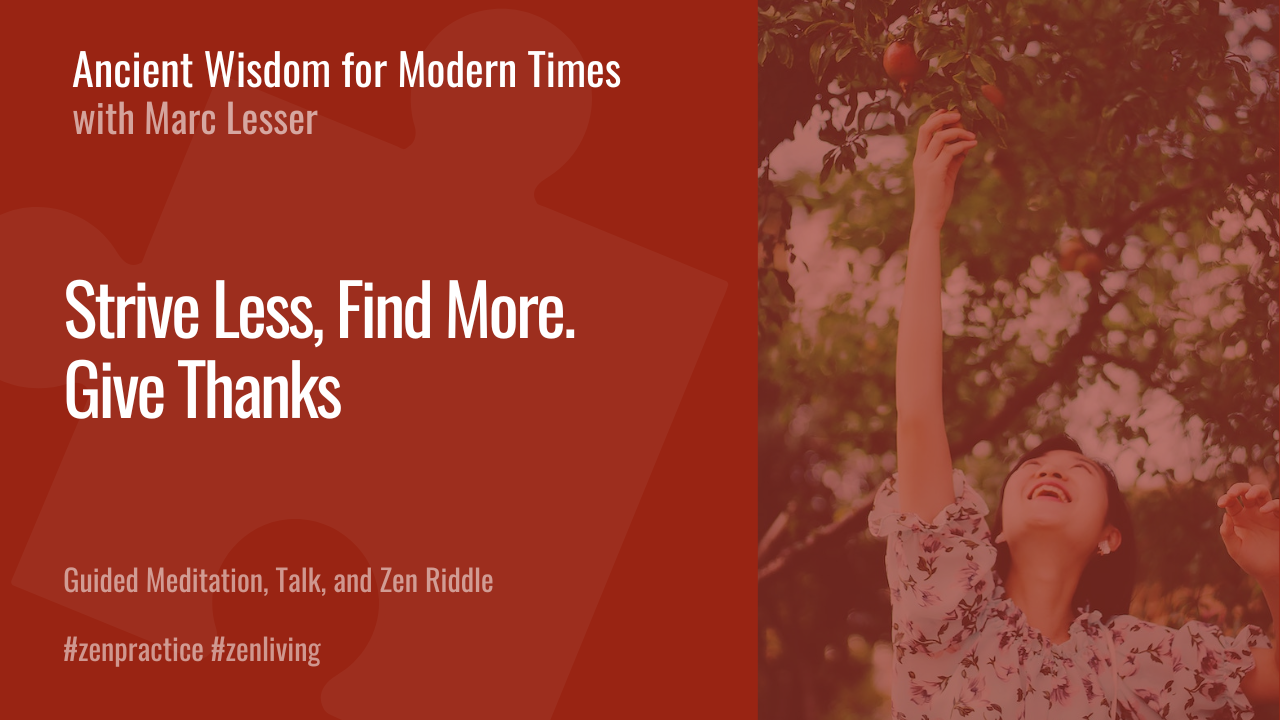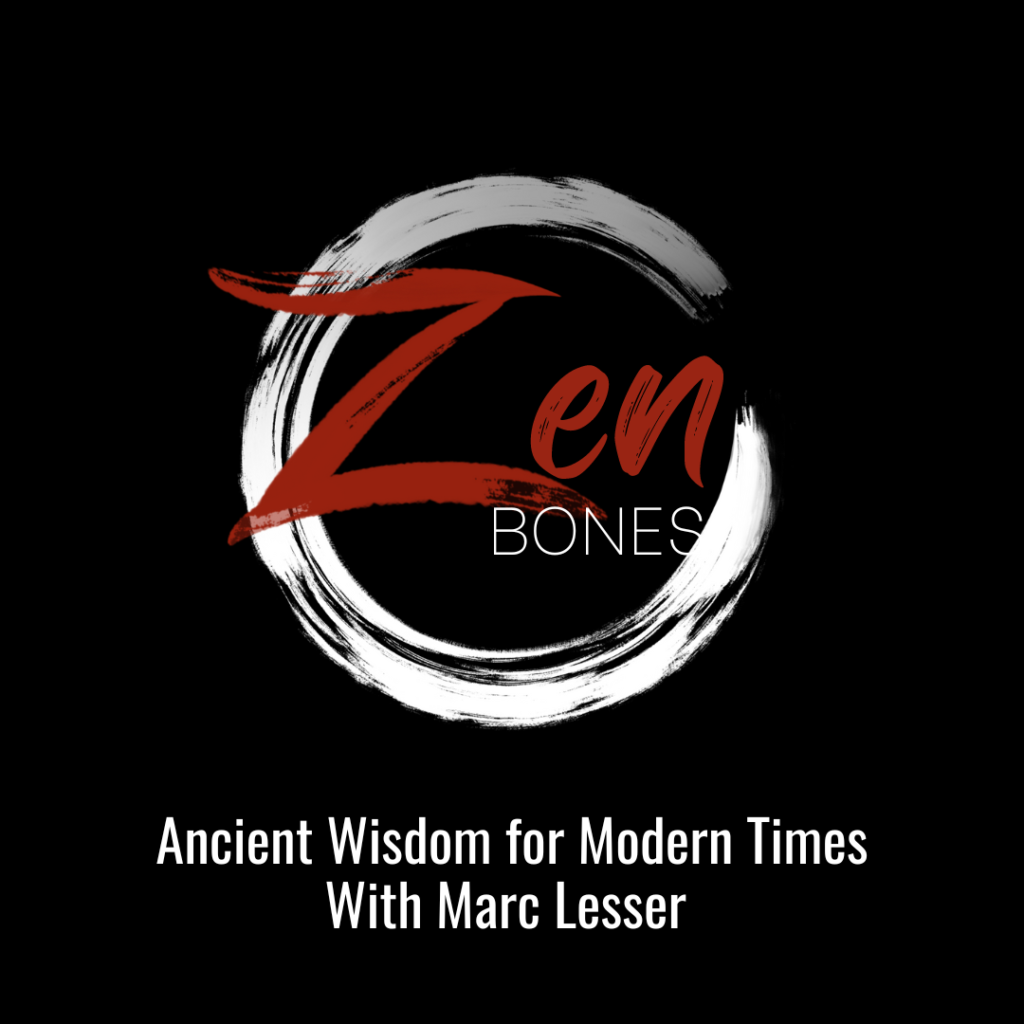This week’s episode begins with a short guided meditation with an emphasis on appreciation followed by a talk about striving less, finding more, and giving thanks. This is the practice and power of more finding and less searching as a way of expressing and living with more gratitude and appreciation. And today’s Zen puzzler comes from a classic Zen story or Zen koan called Wash your bowl; a classic lesson is less striving and more appreciation.
EPISODE TRANSCRIPT
[music]
Marc Lesser: Welcome to Zen Bones. Ancient wisdom for modern times. This is Mark Lesser. Why Zen Bones? Our world is in crisis and ever-shifting, and now more than ever, more wisdom, clarity, and courage are essential, especially in the world of work, business, and leadership. In this week’s episode, we begin with a short guided meditation with an emphasis on appreciation. Then I do a talk about striving less, finding more, and giving thanks. The practice and power of more finding and less searching as a way of expressing and living with more gratitude and appreciation.
Today’s Zen puzzler comes from a classic Zen story or Zen koan called Wash Your Bowl. Very much in this theme of greater finding and less striving. I hope you appreciate and enjoy this episode.
[music]
Marc: Let’s do some sitting practice together.
[bell ringing]
Just stopping this simple ordinary and extraordinary practice of bringing our awareness to our body, our breath, feelings and thoughts, our experience.
[pause 00:02:13]
Shunryū Suzuki likes to say, the Zen teacher, Shunryū Suzuki, Suzuki Roshi, for human beings, there’s no other practice. [silence] Just bringing awareness to our awareness, our consciousness, to what it’s like to be here alive with nothing lacking right now. [silence] At the same time, keeping it simple, bringing awareness to the breath, using the breath as an anchor. Breathing in, breathing out. [silence] What a relief to not need to change anything or do anything differently.
[pause 00:03:58]
Letting go of to-do lists, letting go of the activity of the day. It will all be available whenever we need it. I think this deep knowing that [silence] creating space, allowing space will support our activities, our conversations, relationships, presence. We’re doing this [silence] for some benefit, and at the same time letting it go. It’s a great paradox of meditation practice. I think of being human.
[pause 00:05:19]
Cultivating and allowing this state of mind of nothing lacking, no need right now to be judgemental or comparative. Just this radical sense of acceptance, warmhearted curiosity with whatever we’re feeling, whether we’re grieving or celebrating, calm or not so calm, it doesn’t matter. We’re just here cultivating curiosity mixed with this sense of warm-heartedness. Building inner resources there. Allowing our inner resources to grow and develop. [silence]
Breathing in and breathing out. Just appreciating each breath. [silence] Appreciating our full ordinary and extraordinary experience. Please feel free to pause and continue sitting. I’m going to ring the bell and do a short talk.
[bell rings]
[music]
Strive less, find more, give thanks. This feels like a prescription for how I want to live my life with less striving, more finding, and giving thanks. More a sense of acknowledging the beauty and sacredness of being human. I’m reminded of a book, Siddhartha by Hermann Hesse. I think I first read this when I was a freshman at Rutgers University, and it made quite an impression on me.
I’ve been rereading it. In fact, I like to every few years reread it. It’s a work of fiction that parallels the story of the Buddha with that of a young person’s search for meaning and authenticity. In the book, Siddhartha becomes a follower of the Buddha. Then for a short time decides that he needs to– in the last chapter toward the end of the book, Siddhartha has now grown older and content after a lifetime of exploration. He’s become a ferry person, a person taking people from one side of the river to the other, which of course is a metaphor for helping others to find their way.
He’s finally after a lifetime of striving and ups and downs, he settles on this way of life of ferrying people across the river, helping people find their way. He meets his long-lost dear friend, Govinda. After so much time, Govinda doesn’t recognize someone he had been close friends with, he doesn’t recognize Siddhartha. Govinda shares with him that he continues to be a longtime follower of the Buddha. For a while, they were together following the Buddha, and Siddhartha left and went off exploring. He felt like he needed to have many more life experiences but all these years, Govinda’s still following the Buddha, experiencing a lifetime of striving and searching.
Siddhartha draws his attention to his friend’s striving nature and he says, “When someone seeks, then it easily happens that his eyes see only the thing that he seeks, and he’s able to find nothing. He takes in nothing because he always thinks only about the thing he is seeking but finding means being free, being open, having no goal. In striving toward your goal, you fail to see certain things that are right under your nose.” I thought this was beautiful lines that have stayed with me all these years and that I keep coming back to.
Of course, there’s some searching involved in our lives, or even using this as bringing this down to meditation practice. There’s something that brings us to practice meditation or mindfulness or whatever we might be doing. We might be searching for less stress or more equanimity, or more appreciation. In our work lives, we might be searching for more focus, better results, or however we’ve defined success but there’s something about this practice. Like in meditation, you know, these various intentions or goals bring us to the practice.
Once we sit, the practice is to let it go, to train ourselves to cultivate a state of mind of acceptance, of curiosity, of warmheartedness, and appreciation. This practice is about being able to do that, to shift into a greater sense of appreciation, to let go of striving. This was, I think, one of the great lessons and paradoxes of the book, Siddhartha. I think Siddhartha is advocating less stress, more acknowledging the sacredness of being alive and giving thanks, appreciating everything.
It’s easy to think that we need to be searching and striving. Even I’ve noticed many, many people get into the habit of assuming that we need to be hard on ourselves in order to be successful, in order to solve real problems. We do need to be clear about what we’re doing. We do need to be skillful about how we speak and act, and our presence and our way of being matters a lot.
To me, it’s a lot like, when you go on a job interview, the more you want it and need it, the less attractive a candidate you are. There’s something about just showing up without needing anything, with a kind of inner strength and confidence and attitude that you’re just here to offer. Again, a little bit like Siddhartha, his life had become just helping others from one shore to the next. Whether we’re on a job interview or in all our relationships and how we show up in our lives, there’s something about less striving and more finding. Cultivating the sense of confidence, a way of letting go of searching, and increasing our sense of finding.
When there’s nothing lacking, you can be more yourself. You can live actually with greater freedom, more full-functioning, and your real power. Less striving, more finding, more giving thanks. I want to share a poem by Diane Di Prima. This poem is called Radio.
[music]
I think I forgot to turn
off the radio when
I left my mother’s
womb
In Hasidic Judaism
it is said that before we
are born an angel
enters the womb,
strikes us on the
mouth
and we forget all
that we knew of
previous lives—
all that we know
of heaven
I think that I forgot
to forget.
I was born into two
places at once—
In one, it was chilly
lonely physical &
uncomfortable
in the other, I stayed
in the dimension of
Spirit. What I knew,
I knew.
I did not forget
Voices
The world of spirit
held me in its arms.
I think this is a lot like the world of striving is the world where it’s chilly, lonely, physical, and uncomfortable. We need that world. We need that world of loneliness, physicality, discomfort but we also need the world of finding, the dimension of sacredness, of spirit, of being held, not needing anything. Please, I hope you can play with, cultivate less striving, more finding, and more giving thanks, more appreciation.
[music]
Welcome to the Zen Bones puzzler, where I will regularly be presenting a story or a Zen cone or a poem, something to contemplate, to think about, a story that has purpose. It’s about developing greater insight and reflection, not so much for a solution but as a way to support your practice, a kind of meditation in daily life.
[music]
Today’s Zen Bones puzzler comes from a very traditional Zen koan and it’s one of the more popular koans at least in my world. I’ve talked about this particular koan many times over these years and every time it’s different for me. I think it fits really beautifully in today’s episode about less striving, more finding, more appreciation. This koan is called Wash Your Bowl, where a student arrives at the monastery and says to the teacher, “Please teach me.” Very common. “I’ve arrived, please teach me.” The teacher looks at the student and asks, “Have you eaten breakfast?”
The student responds, “Yes, I have.” The teacher says, “Wash your bowl,” and walks away. Again, I think first of all, these Zen koans, these Zen puzzlers, they don’t have answers. They’re meant to be inspirational. They’re meant to free us from our habit energy. One way to work with this is just to stay with the words of the teacher, wash your bowl. You might write about it, you might write it down on a piece of paper. I think it’s a simple but profound lesson on the sense that we’re all striving. We are all striving for something. The purpose of our lives I think is to find freedom, find our true nature, find our real selves.
There’s a beautiful line where Zen teacher, Shunryū Suzuki says this is the purpose of our lives. The secret is that we find it in every step that we take or here in this Zen puzzler, the secret is that we find it not from the words of the teacher so much but we find it from realizing that we already have it. Just go wash your bowl. Just go eat your dinner. Just go. Whatever we’re doing, that’s where the teaching is. Let go of striving and shift into a sense of finding, a sense of no difference in searching and finding, no difference in ordinary and sacred.
Just completely be yourself. Find freedom in everything that we do. This is a story of finding instead of searching. The real teaching is in our awareness, our experience, learning, growing, building, strength, and character from everything that we do. Letting go of any sense that something is missing or lacking. The student says, “I’m here, please teach me.” The teacher says, “Have you eaten your breakfast?” “Yes.” “Wash your bowl.” Please enjoy immensely washing your bowl. Thank you.
[music]
Listen in each week for interviews, teachings, and guided meditations. You’ll receive supportive tools for creating more meaningful work and mindfulness practices to develop yourself, to influence your organization, and to help change the world. Thank you for listening.
[music]
[00:23:28] [END OF AUDIO]









